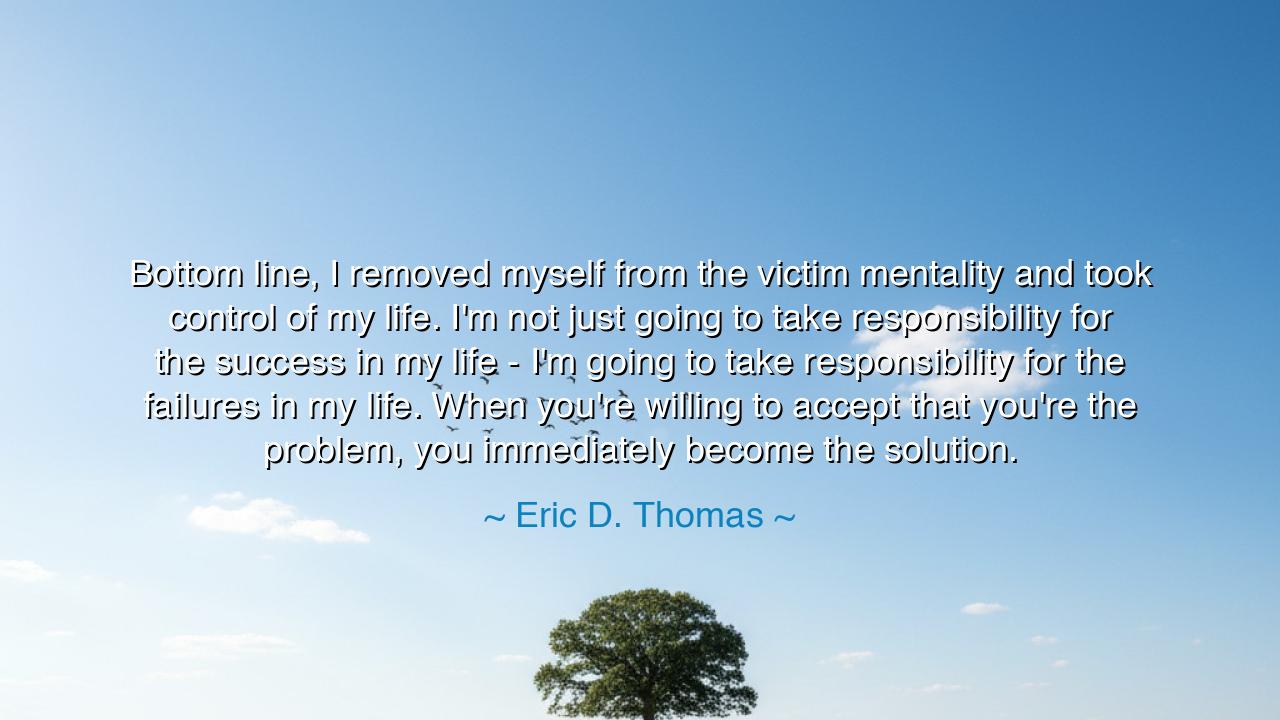
Bottom line, I removed myself from the victim mentality and took
Bottom line, I removed myself from the victim mentality and took control of my life. I'm not just going to take responsibility for the success in my life - I'm going to take responsibility for the failures in my life. When you're willing to accept that you're the problem, you immediately become the solution.






Hear the thunderous voice of Eric D. Thomas, the preacher of perseverance, who declared: “Bottom line, I removed myself from the victim mentality and took control of my life. I’m not just going to take responsibility for the success in my life—I’m going to take responsibility for the failures in my life. When you’re willing to accept that you’re the problem, you immediately become the solution.” These words are forged in the fire of hardship, spoken not as theory but as testimony. For Thomas, once homeless, once broken, rose not by chance but by seizing his own power, by casting aside excuses, and by shouldering the full weight of his destiny.
The ancients, too, proclaimed this truth. The Stoic Epictetus, born a slave, taught that though a man may be bound in chains, his mind remains free, and his spirit unconquered unless he surrenders it. To blame the world is to remain shackled, but to claim responsibility is to unlock the chains of fate. Thomas walks in this same wisdom: by declaring himself both problem and solution, he claims dominion over his life. No oppressor, no misfortune, no failure can defeat the one who chooses ownership over blame.
Consider the tale of Abraham Lincoln, who failed in business, who lost elections, who suffered defeat after defeat. Had he embraced the victim mentality, he would have faded into obscurity, another forgotten man swallowed by circumstance. But Lincoln bore his failures like iron weights that tempered his soul. He rose again and again, until he became the leader who preserved a nation in its darkest hour. His story is proof that responsibility for both success and failure is the path to greatness.
Thomas warns us of the trap of blame, for it is a sweet poison. To say, “I failed because of them,” relieves the heart for a moment, but it steals all power. The man who blames others for his ruin cannot rise, for he has surrendered the tools of change. But the one who says, “I failed because of me,” has already found the key to victory—for if he is the problem, then by his own hands he may shape the solution. This is a hard teaching, yet it is the gateway to freedom.
The wisdom is not only heroic, but deeply practical. In every life, storms will come—loss, betrayal, disappointment. If in these moments we cling to excuses, we will sink like stones. But if we embrace responsibility, we will learn, adapt, and grow stronger. Like the blacksmith who beats iron into a blade, our failures, owned and accepted, become the forge of our character. Thus, Thomas’ words are not only motivational—they are a blueprint for transformation.
The lesson is plain: cast aside the victim mentality. Take full ownership, not only of your victories, but of your defeats. When you stumble, ask not, “Who pushed me?” but, “How shall I rise?” For the world cannot rob a man who refuses to surrender responsibility. The gods themselves honor those who bear their burdens with courage, for in their resilience they reflect divine strength.
Practical wisdom follows: each day, review your actions. When you fall short, admit it swiftly, without excuse, and resolve to improve. When you triumph, rejoice, but do not let pride blind you—credit your discipline, your choices, and your persistence. Write your failures as lessons, not curses, and use them as stepping stones. In doing so, you will stand as master of your fate, rather than servant of your circumstances.
So let these words of Eric D. Thomas echo in your heart: “When you’re willing to accept that you’re the problem, you immediately become the solution.” This is not despair, but empowerment. It is the heroic creed of those who refuse to bow to circumstance. Live by it, and your life will not be ruled by excuses or by others, but by the unbreakable force of your own will. And in that will lies freedom, greatness, and the eternal fire of true success.






AAdministratorAdministrator
Welcome, honored guests. Please leave a comment, we will respond soon